| Srl | Item |
| 1 |
ID:
130983


|
|
|
|
|
| Publication |
2014.
|
| Summary/Abstract |
Many studies have been performed to assess the impacts of corporate social responsibility (CSR) on the financial performance of companies. There are, however, very few studies that analyze how CSR policies and instruments affect the realization of social and environmental CSR goals, such as the reduction of workplace accidents or CO2 emissions. Therefore, it remains uncertain to what extent CSR really contributes to sustainable development and whether it can serve as an alternative to government regulation to internalize external effects from market operation. The present study provides an explorative empirical analysis that aims to fill this gap. We employ regression analysis on a sample of 109 Chinese companies. The estimation results show that having a code of conduct stimulates the implementation of other organizational CSR instruments, but CSR implementation only partly affects the realization of CSR goals. Having codes of conduct without implementing CSR does not have a significant impact on societal welfare.
|
|
|
|
|
|
|
|
|
|
|
|
|
|
|
|
| 2 |
ID:
130978
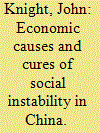

|
|
|
|
|
| Publication |
2014.
|
| Summary/Abstract |
China's leaders have often expressed concerns about social instability, viewed as a threat both to the political order and to continued rapid growth. Slower growth might, in turn, further undermine social stability. Using survey data, the present paper examines the economic determinants of social instability. Four main determinants are identified: past and expected growth of income, income inequality, economic insecurity and misgovernance. The paper then considers possible policies to reduce social instability, examining each of the determinants in turn.
|
|
|
|
|
|
|
|
|
|
|
|
|
|
|
|
| 3 |
ID:
130977
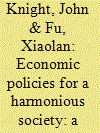

|
|
|
|
|
| Publication |
2014.
|
| Summary/Abstract |
China's remarkable economic growth has produced dramatic structural and socioeconomic change.
Economic growth has solved many problems but the accompanying changes in the economy and
society have brought new problems to the fore. This has been recognized by China's Government
in the recent emphasis that it has placed on the need to create a "harmonious society." The new
leadership will wish to devise new policies for the current challenges and those ahead
|
|
|
|
|
|
|
|
|
|
|
|
|
|
|
|
| 4 |
ID:
130981
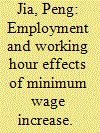

|
|
|
|
|
| Publication |
2014.
|
| Summary/Abstract |
Using a difference-in-differences model, the present paper provides empirical evidence of minimum wage effects on employment and working hours in China. The results show that male employment is not affected by a minimum wage increase, although men's working hours do increase. In contrast, female employment is more likely to be negatively affected by a minimum wage increase, while their working hours remain unchanged. This may lead to women being in a more disadvantaged position in the workforce, and adopting a monthly minimum wage may induce firms to extend men's working hours. Therefore, to better protect disadvantaged workers, we suggest that minimum wage regulation should focus on the target group of less-educated women, and that a unified minimum hourly wage needs to be set for both full-time and part-time workers. Meanwhile, the importance of human capital accumulation should be addressed in alleviating the negative effects of minimum wage increases.
|
|
|
|
|
|
|
|
|
|
|
|
|
|
|
|
| 5 |
ID:
130980
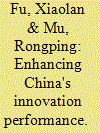

|
|
|
|
|
| Publication |
2014.
|
| Summary/Abstract |
Transforming China into an innovation-driven economy has been one of the top priorities of the Chinese Government. This paper examines the policy choices involved in the extended national innovation performance framework for creating an open innovation system. Innovation capabilities, incentives and institutional frameworks are examined. The paper argues that China should continue to increase its investment in R&D and in education, and that there should also be an attempt to strengthen the incentive system at the macro, meso and micro levels. This strengthening may include reforms to: release the power of competition and guide resources towards innovative sectors; adopt appropriate human resource management, such as appraisal and remuneration systems; create effective policies for research funding management; and evaluate the efficiency of research to encourage the creativity of researchers, managers and employees. The paper also discusses the space for industrial policy in the 21st century.
|
|
|
|
|
|
|
|
|
|
|
|
|
|
|
|
| 6 |
ID:
130982


|
|
|
|
|
| Publication |
2014.
|
| Summary/Abstract |
This study uses an event study methodology to examine how the Chinese market reacts to announcements of involvement in corporate social responsibility (CSR) by Southern Weekend (a Chinese newspaper) for Chinese firms from 2008 to 2012. Our results show significant and positive market reactions, supporting the instrumental stakeholder theory. We attribute the positive market response to social capital development and real growth options related to the CSR involvement by the Chinese firms.
|
|
|
|
|
|
|
|
|
|
|
|
|
|
|
|
| 7 |
ID:
130979
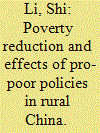

|
|
|
|
|
| Publication |
2014.
|
| Summary/Abstract |
The present paper describes changes in poverty reduction in recent decades and the effects of income growth and inequality on poverty reduction in rural China. The paper also examines the main poverty alleviation policies implemented in rural areas over the past 10 years and assesses the effectiveness and efficiency of these policies from the perspective of targeting accuracy. It is found that China has achieved significant progress in rural poverty reduction in recent decades, although the speed of poverty reduction has varied from one period to another. The largest contribution to rural poverty reduction has been economic growth, which has been increasingly offset by the inequality effect on poverty reduction. In addition, poverty alleviation policies are effective, but not efficient.
|
|
|
|
|
|
|
|
|
|
|
|
|
|
|
|